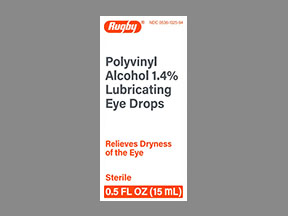
Polyvinyl Alcohol Coupons & Savings Card – Discount Prices from $8.13
Generic for: Artificial tears
My prescription
Edit
15ML of 1.4%, Polyvinyl Alcohol (1 Bottle)
Select pharmacy

Walgreens
$8.13
COUPON PRICE
Albertsons
$9.09
COUPON PRICEPolyvinyl Alcohol savings card
Show this card to your pharmacist
Walgreens
$8.13
BIN
ID
PCN
GRP
011867
LHB451034D
HT
LABH001
Powered by
Price history for Artificial Tears (brand) & Polyvinyl Alcohol (generic)
1 Bottle, 15ML of 1.4%
Average retail price for Artificial Tears
Average retail price for Polyvinyl Alcohol
Average SaveHealth price for Polyvinyl Alcohol
Our price history data is based on aggregated prescription data collected from participating pharmacies in America. Our prescription data updates daily to reflect the latest price changes. If you notice a missing data point, it means there wasn't sufficient data available to generate a monetary value for that date.
We analyzed Polyvinyl Alcohol prices for (15ML of 1.4%, 1 Bottle) over the last 12 months. The average retail price was $41.92, while the average price using the SaveHealth discount card was $9.61. That's a savings of approximately 77.08% when using our Polyvinyl Alcohol coupon.
Compared to the generic version, Artificial Tears had an average price of $23.99 over the same time period. With the SaveHealth savings card, Polyvinyl Alcohol is 59.94% cheaper on average than Artificial Tears.
*Retail prices are based on pharmacy claims data, and may not be accurate when we don't have enough claims.
Polyvinyl Alcohol dosage forms
Dosage Quantity Price from Per unit 1GM 1 Bottle $1.01 $1.01 1GM 2 Bottles $1.01 $0.51 1GM 3 Bottles $1.01 $0.34 15ML of 1.4% 1 Bottle $14.03 $14.03 15ML of 1.4% 2 Bottles $19.05 $9.53 15ML of 1.4% 3 Bottles $30.73 $10.24
| Dosage | Quantity | Price from | Per unit |
|---|---|---|---|
| 1GM | 1 Bottle | $1.01 | $1.01 |
| 1GM | 2 Bottles | $1.01 | $0.51 |
| 1GM | 3 Bottles | $1.01 | $0.34 |
| 15ML of 1.4% | 1 Bottle | $14.03 | $14.03 |
| 15ML of 1.4% | 2 Bottles | $19.05 | $9.53 |
| 15ML of 1.4% | 3 Bottles | $30.73 | $10.24 |
